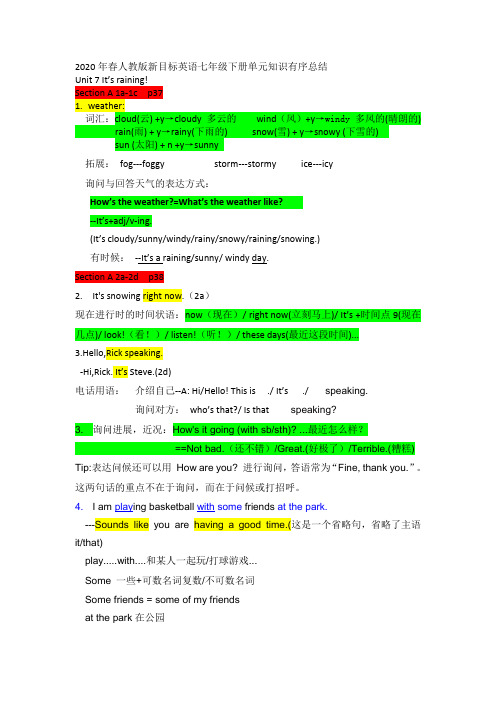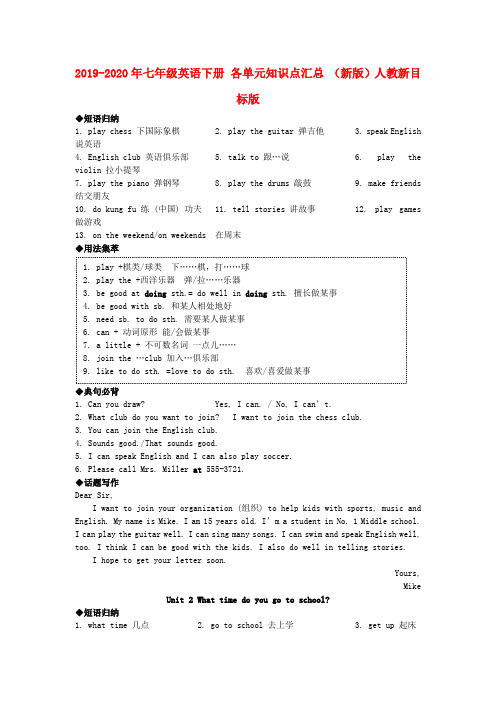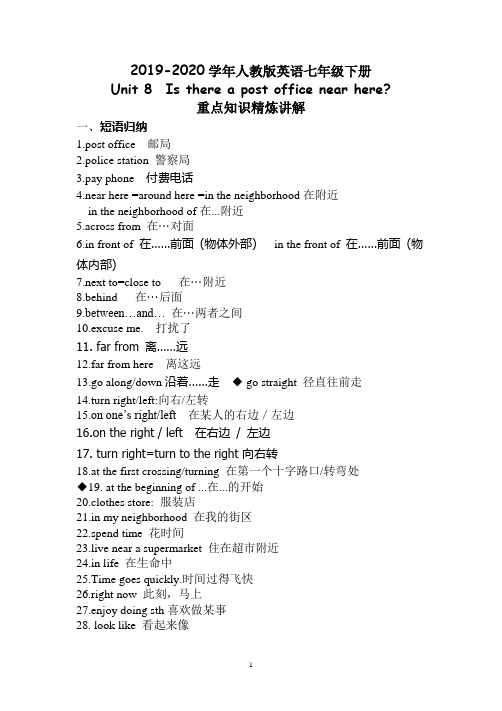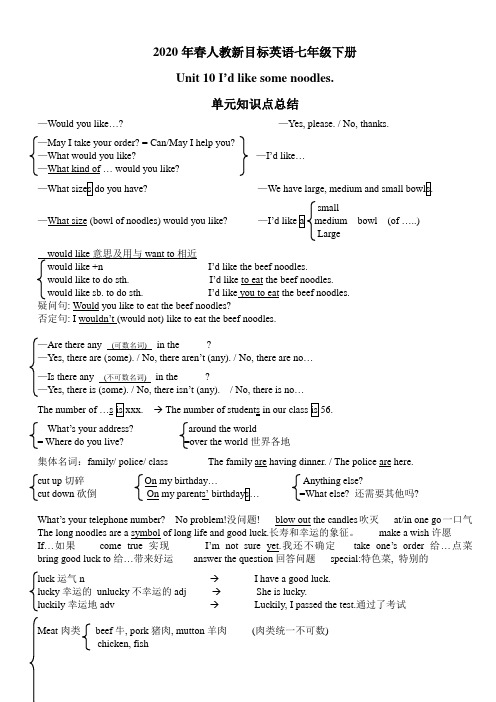2020年人教版七年级英语下册重点知识归纳
- 格式:docx
- 大小:694.21 KB
- 文档页数:15

2020年春人教版新目标英语七年级下册单元知识有序总结Unit 7 It’s raining!Section A 1a-1c p371.weather:词汇:cloud(云) +y→cloudy 多云的wind(风)+y→windy 多风的(晴朗的) rain(雨) + y→rainy(下雨的) snow(雪) + y→snowy (下雪的)sun (太阳) + n +y→sunny拓展:fog---foggy storm---stormy ice---icy询问与回答天气的表达方式:How’s the weather?=What’s the weather like?--It’s+adj/v-ing.(It’s cloudy/sunny/windy/rainy/snowy/raining/snowing.)有时候:--It’s a raining/sunny/ windy day.Section A 2a-2d p382.It's snowing right now.(2a)现在进行时的时间状语:now(现在)/ right now(立刻马上)/ It’s +时间点9(现在几点)/ look!(看!)/ listen!(听!)/ these days(最近这段时间)...3.Hello,Rick speaking.-Hi,Rick. It’s Steve.(2d)电话用语:介绍自己--A: Hi/Hello! This is××./ It’s ××./ ×× speaking.询问对方:who’s that?/ Is that ××speaking?3. 询问进展,近况:How's it going (with sb/sth)? ...最近怎么样?==Not bad.(还不错)/Great.(好极了)/Terrible.(糟糕) Tip:表达问候还可以用How are you? 进行询问,答语常为“Fine, thank you.”。

七年级下册英语知识点2020学习的第⼀步——就是求知。
顾名思义,就是检查或研究以便获得更多的知识!知识就是⼒量,我们就是要学会求知,变成⼀个善于学习、善于思考、具有优良品质的好青年。
下⾯给⼤家带来⼀些关于七年级下册英语知识点2020,希望对⼤家有所帮助。
七年级下册英语知识点11.Chinese paintings 中国油画2.at the museum 在博物馆3.1earn all about 全⾯了解4.row a boat 划船5.how far 多远6.each other 互相7.go shopping 去购物8.on a farm 在农场9.hear the birds sing 听到鸟⼉歌唱10.raise cows 养⽜11.show sb.Around 带领某⼈参观12.a wonderful place to live ⼀个居住的好地⽅1.An old friend of mine is coming to see me,Hobo.霍波,我的⼀位⽼朋友要来看我。
an old friend of mine意为“我的⼀位⽼朋友"。
在英语中冠词与物主代词不能同时放在同⼀个修饰词前,要表⽰“我的⼀个??"“他的两个??"则须⽤“冠词/数词+名词+of+名词性物主代词”结构。
如:a pen of Jim’s(吉姆的⼀⽀钢笔),a book of hers(她的⼀本书)。
2.Is it enough for a can of dog foo d?这钱够买⼀听狗粮吗?此处的for相当于to buy a can of dog food意为“⼀听狗粮"。
3.Shopping is fun.购物真有趣。
句中shopping是动名词作主语。
此结构可以转换成:It is fun to shop.动名词在句中作主语看作单数,但如果是两个动名词作主语时要看作复数。

2019-2020年七年级英语下册各单元知识点汇总(新版)人教新目标版◆短语归纳1. play chess 下国际象棋2. play the guitar 弹吉他3. speak English 说英语4. English club 英语俱乐部5. talk to 跟…说6. play the violin 拉小提琴7. play the piano 弹钢琴 8. play the drums 敲鼓9. make friends 结交朋友10. do kung fu 练 (中国) 功夫11. tell stories 讲故事12. play games 做游戏13. on the weekend/on weekends 在周末◆用法集萃1. play +棋类/球类下……棋,打……球2. play the +西洋乐器弹/拉……乐器3. be good at doing sth.= do well in doing sth. 擅长做某事4. be good with sb. 和某人相处地好5. need sb. to do sth. 需要某人做某事6. can + 动词原形能/会做某事7. a little + 不可数名词一点儿……8. join the …club 加入…俱乐部9. like to do sth. =love to do sth. 喜欢/喜爱做某事◆典句必背1. Can you draw? Yes, I can. / No, I can’t.2. What club do you want to join? I want to join the chess club.3. You can join the English club.4. Sounds good./That sounds good.5. I can speak English and I can also play soccer.6. Please call Mrs. Miller at 555-3721.◆话题写作Dear Sir,I want to join your organization (组织) to help kids with sports, music and English. My name is Mike. I am 15 years old. I’m a student in No. 1 Middle school.I can play the guitar well. I can sing many songs. I can swim and speak English well, too. I think I can be good with the kids. I also do well in telling stories.I hope to get your letter soon.Yours,MikeUnit 2 What time do you go to school?◆短语归纳1. what time 几点2. go to school 去上学3. get up 起床4. take a shower 洗淋浴5. brush teeth 刷牙6. get to 到达7. do homework 做家庭作业8. go to work 去上班9. go home 回家10. eat breakfast 吃早饭11. get dressed 穿上衣服12. get home 到家13. either…or… 要么…要么…14. go to bed 上床睡觉15. in the morning/ afternoon/ evening 在上午/下午/晚上16. take a walk 散步17. lots of=a lot of 许多,大量18. radio station 广播电台19. at night 在晚上20. be late for=arrive late for 迟到◆用法集萃1. at + 具体时间点在几点(几分)2. eat breakfast/ lunch/dinner 吃早饭/午饭/晚饭3. thirty\half past +基数词……点半4. fifteen\a quarter to +基数词差一刻到……点5. take a/an +名词从事……活动6. from …to … 从……到……7. need to do sth 需要做某事◆典句必背1. What time do you usually get up? I usually get up at six thirty.2. That’s a funny time for breakfast.3. When do students usually eat dinner? They usually eat dinner at a quarter to seven in the evening.4. In the evening, I either watch TV or play puter games.5. At twelve, she eats lots of fruit and vegetables for lunch..6. She knows it’s not good for her, but it tastes good.7. Here are your clothes.◆话题写作主题:谈论日常作息习惯My School DayI am a student. I usually get up at seven, and I eat breakfast at seven thirty. Then I go to school at eight. School starts at eight thirty. I eat lunch at twelve.I go home at 17:00. I often eat dinner at 19:00 and then play the piano. I do my homework at 20:00. At 22:00, I go to bed.Unit 3 How do you get to school?◆短语归纳1. get to school 到达学校2. take the subway 乘地铁3. ridea bike 骑自行车4. how far 多远5. from home to school 从家到学校6. every day 每天7. take the bus 乘公共汽车8. by bike 骑自行车9. busstop 公共汽车站10. think of 认为11. between … and … 在…和…之间12. one 11-year-old boy 一个11岁的男孩13. play with … 和…玩14. e true 实现15. have to 不得不◆用法集萃1. take… to …= go to … by… 乘…去…2. How do / does (sb)get to …? …是怎样到…的?3. How far is it from … to …? 从…到…有多远?4. It takes sb. some time to do sth. 做某事花费某人多长时间。

2019-2020学年人教版英语七年级下册Unit 8 Is there a post office near here?重点知识精炼讲解一、短语归纳1.post office 邮局2.police station 警察局3.pay phone 付费电话4.near here =around here =in the neighborhood在附近in the neighborhood of在...附近5.across from 在···对面6.in front of 在……前面(物体外部) in the front of 在……前面(物体内部)7.next to=close to 在···附近8.behind 在···后面9.between…and…在···两者之间10.excuse me. 打扰了11. far from 离……远12.far from here 离这远13.go along/down沿着……走◆ go straight 径直往前走14.turn right/left:向右/左转15.on one’s right/left在某人的右边/左边16.on the right / left 在右边/ 左边17. turn right=turn to the right 向右转18.at the first crossing/turning 在第一个十字路口/转弯处◆19. at the beginning of ...在...的开始20.clothes store: 服装店21.in my neighborhood 在我的街区22.spend time 花时间23.live near a supermarket 住在超市附近24.in life 在生命中25.Time goes quickly.时间过得飞快26.right now 此刻,马上27.enjoy doing sth喜欢做某事28. look like 看起来像29.on Center street 在中心大街on Bridge Street在大桥街上30.the way to ...去...的路on one’s way to +名词在去...的路上31.have free time/be free 有空闲的时间/免费(有空)32.watch sb. doing sth 观看某人正在做某事二、用法集萃1. ★go across river/road 穿过河/马路(从表面穿过)go through forest/crowd穿过森林/人群(从内部穿过)区别:across,cross,through,overacross是介词,“横过,在对面”表示从物体表面穿过cross是动词,相当于go/ walk acrossthrough是介词,表示从物体中间或里面穿过go through the door over是介词,“横过,越过”表示从物体上空越过,跨过fly over 2. go along Bridge Street= go down Bridge Street= walk along Bridge Street= walk down Bridge Street 沿着桥街走3. in front of (外部的)在...前面★in the front of 在….(内部的)前部4. watch sb. to do sth.看见某人做某事(强调看到动作的整个过程)watch sb. doing sth.看见某人做某事(强调看到动作正在进行)5.there be结构表示“某时、某地存在着什么事物或人”包括there is、there are★There be + sth + 地点状语(Be遵守就近原则)There be表示“某处存在某物或某人”;have表示“某人拥有某物/某人”there 和have不能同时连用(1)肯定句式:there be + 主语(名词)+其他There is a post office near here.There are some restaurants near here(2)否定句:在be动词后面加not。

2020年春人教新目标英语七年级下册Unit 10 I’d like some noodles.单元知识点总结—Would you like…? —Yes, please. / No, thanks.—May I take your order? = Can/May I help you?—What would you like? —I’d like…—What kind of … would you like?——small—What size (bowl of noodles) would you like? —I’d like a medium bowl (of …..)LargeI’d like the beef noodles.I’d like to eat the beef noodles.I’d like you to eat the beef noodles.: Would you like to eat the beef noodles?否定句: I wouldn’t (would not) like to eat the beef noodles.—Are there any (可数名词)in the _____?—Yes, there are (some). / No, there aren’t (any). / No, there are no…—Is there any (不可数名词) in the _____?—Yes, there is (some). / No, there isn’t (any). / No, there is no…The number of …s is xxx. → The number of students in our class is 56.What’s your address? around the world= Where do you live? =over the world世界各地集体名词:family/ police/ class The family are having dinner. / The police are here.cut up切碎…Anything else?cut down砍倒On my parents’ birthdays=What else? 还需要其他吗?What’s your telephone number? No problem!没问题! blow out the candles吹灭at/in one go一口气The long noodles are a symbol of long life and good luck.长寿和幸运的象征。

Unit11 How was your school trip 要点详解How was your school trip? 重点词汇1. beat, win(1)beat指在比赛或战斗中打败某人。
意为“蠃”,此时,其宾语只能是表示人或团队的词语,不能用表示比赛、奖品等内容的词语作其宾语。
beat的反义词为lose. lose to sb. 输给某人。
(2)win表示“赢”,其宾语是表示比赛、奖品等内容的词语,不能用表示人的词语作其宾语。
win还可以作不及物动词用,后面不接宾语,表示“获胜”。
其反义词也为lose. lose sth.. 输了某事(物)。
如:He won the tennis match. 他赢得了那场网球比赛。
We are sure that we can beat them. 我们相信能战胜他们。
2. gift 礼物(1) gift用作名词,表示“礼品,礼物”时,与present同义。
Thank you for your beautiful gift. 谢谢你送给我的漂亮礼物。
(2) gift用作名词,表示“天赋,天资,才能”时,常构成短语have a gift for意为“有某方面的天赋。
如:She has a gift for music. 她有音乐天赋。
(3) gifted用作形容词,意为“有天才的,有才华的”。
如:He is a very gift person. 他是一个很有才华的人。
3. visitor 访问者,参观者,游客Millions of visitors visit the Great Wall every year.每年有数百万游客游览长城。
visitor是由“动词visit+or”构成的名词,类似的词还有actor, inventor, translator等。
思维拓展:“动词+er”构成名词,如:worker, teacher, singer等。
The teacher teaches us very well. 这位老师教我们教得非常好。
重点单词蹈5.draw(v.)画6.speak(v.)说(某种语言);说话★7.join(v.)参加;加入8.club(n.)俱乐部;社团9.tell(v.)讲述;告诉★10.story(n.)故事;小说11.write(v.)写作;写字★12.show (n.)演出;节目(v.)给……看;展示34.work(n.& v.)工作35.funny (adj.)奇怪的;滑稽好笑的36.exercise(v.& n.)锻炼;练习★37.best(adj.)最好的(adv.)最好地;最★38.half(n.& pron.)一半;半数★39.past(prep.)晚于;过(时间)(adj.)过去的61.boat(n.)小船62.afraid(adj.)害怕;畏惧★63.leave(v.)离开;留下★64.dream(n.)梦想;睡梦(v.)做梦65.true(adj.)真的;符合事实的66.rule(n.)规则;规章67.arrive(v.)到达68.fight(v.& n.)打架;25.brush(v.)刷;刷净(n.)刷子26.tooth(n.)牙齿★27.shower(v.)淋浴 (n.)淋浴器(间)ually(adv.)通常地;一般地29.forty(num.)四十30.never(adv.)从不;绝不★49.ride(v.)骑(n.)旅程50.ninety(num.)九十51.hundred (num.)一百★52.minute(n.)分钟53.far(adv.& adj.)远;远的54.drive(v.)开车★55.live(v.)居住;生活56.stop(n.)车站;停81.feel(v.)感受;觉得★82.strict(adj.)严格的;严厉的★83.remember (v.)记住;记起84.follow(v.)遵循;跟随85.luck(n.)幸运;运气★86.learn(v.)学习;学会★→teeth(复数)5.life(n.)生活;生命→lives(复数)6.far(adj.& adv.)远;远的→farther/further(比较级)→farthest/furthest(最高级)7.cross(v.)穿过→across(prep.)穿过→crossing(n.)十字路口12.fun(adj.& n.)有趣的;乐趣→funny(adj.)有趣的;滑稽好笑的ual(adj.)寻常的→usually(adv.)通常地→unusual(形容词的反义词)不寻常的;与众不同的19.ride(v.)骑→rode(过去式)→ridden(过去分词)20.draw(v.)画画→drew(过去式)→drawn(过去分词)21.speak(v.)说(某种语言);说话→spoke(过去式)→spoken(过去分词)→speaker(n.)发言人重点短语chess2.说英语speakEnglish3.擅长于……be goodat…4.跟……说talk to…5.敲鼓play the drums6.拉小提琴play theviolin7.弹钢琴play thepiano8.弹吉他play thehelp(sb.) with sth.14.(在)周末on theweekend15.起床get up16.穿上衣服getdressed17.洗淋浴take ashower18.听……listen to…19.广播电台radiostation20.(在)周末onsubway26.骑自行车ride abike27.每天every day28.骑自行车by bike29.认为think of30.在……和……之间between…and…31.实现;成为现实cometrue32.准时(be) on time33.餐厅dining hall重点句子—I want to join the chessclub.我想参加象棋俱乐部.3.You are very __good__at__telling stories.你非常擅长讲故事。
人教版七年级英语知识点总结2020最新在学习初一英语语法时,要认真、细心,不要觉得一些地方不重要而得过且过。
下面是小偏整理的人教版七年级英语知识点总结2020最新,感谢您的每一次阅读。
人教版七年级英语知识点总结2020最新1.短语归纳:pencilbox铅笔盒excuseme打扰了thebluepen这支蓝色的钢笔Anna’sbook安娜的书IDcard身份证schoolIDcard学生证computergame电子游戏intheschoollibrary在学校图书馆ask…for…向…要…e-mailsb给某人发电子邮件callsb给某人打电话losesth丢失某物findsth拾到某物asetofkeys一串钥匙lostandfound失物招领2.必备典句:1.—Isthisyourpencil?这是你的铅笔吗?—Yes,itis.是的,它是。
2.—Isthatyourschoolbag?那是你的书包吗?—No,itisn’t.不,它不是。
3.It’smine/his/hers.这是我的/他的/她的。
4.Theyarehers.它们是她的。
5.Isthatyours?那是你的吗?6.Whataboutthisdictionary?这本字典呢?7.Thankyouforyourhelp.谢谢你的帮助。
8.Howdoyouspellit?你怎么拼写它?9.Imustfindit.我必须找到它。
10.Callmeat685-6034.请打电话685-6034找我。
3.含be动词的一般疑问句1.将含有be动词的陈述句转换一般疑问句将be动词(am,is,are)提到句首(首字母要大写),如果原句中的主语是第一人称要变为第二人称,句末加问号。
例:IamZhangYang→AreyouZhangYang?Thatismybike→Isthatyourbike?2.含有be动词的一般疑问句的肯定回答与否定回答肯定回答:Yes,主语+be否定回答:No,主语+be例:—Isthisyourpen?—Yes,itis/No,itisn’t.4.Imustfindit.我必须找到它。
初中英语重点知识点梳理. 7.2-3重点短语get to到达everyday每天by bike骑自行车take the subway乘地铁ride a bike骑自行车how far多远how long多长时间walk to school步行去上学have a good day玩得愉快重点句型1.How do you get to school? 你是怎样到学校的?2.How far is it from your home to school? 从你家到学校有多远?3.How long does it take you to get to school? 你到学校花费多长时间?1.one hundred and five 一百零五要点精析hundred数词,意为“一百".例:What will happen in a hundred years? 一百年后将发生什么?知识拓展①当hundred前面有具体数字时,其后不加s,也不和of连用。
例:There are nine hundred students on the playground. 操场上有九百名学生。
②若表示一个不确定的数字,前面没有具体数字时,其后要加s,且与of连用,hundreds of表示“数以百计的,成百上干的".例:There are hundreds of trees on the hill. 小山上有成百上干棵树,【助记】hundred,thousand,million与bili on的用法模糊数字两有(有s有of),具体数字两无(无s无of).2.I ride it to school everyday. 我每天骑着它去学校。
要点精析every形容词,意为“每一;每个“,其后接单数可数名词.everyday意为“每天",常用作一般现在时的时间状语,例:Every student comes here.每一个学生都来这儿.They are busy everyday.他们每天都忙。
2020年人教版七年级英语下册重点知识归纳 一、词汇拓展
人教版七年级下册英语单元复习资料 Unit 1 Can you play the guitar?
1. sing(现在分词) singing 2. dance(现在分词) dancing 3. swim (现在分词) swimming 4.draw (同义词) paint 5. story(复数) stories 6. Write (同音词) right 7. drum(复数) drums 8. piano(复数) pianos 9. also(同义词) too/either 10. make(三单) makes (现在分词) making 11. Center(形容词) central 12. teach(名词) teacher 13. musician(形容词) musical 二、重点短语与句型 1. play chess 下国际象棋 speak English 说英语 play the guitar 弹吉它 want to do 想做 2. be good at 擅长于 what club /sports 什么俱乐部 /运动music /swimming /sports club 音乐 /游泳 /运动俱乐部 be good at doing sth.= do well in doing sth. 擅长做某事 like to do 喜欢做 What about ? 怎么样? be good at doing 擅长做 tell stories 讲故事 the story telling club 讲故事俱乐部 3. talk to 跟 ..说 write stories 写 小 说want for the school show 为 学 校 表 演 招聘 after school 放 学 后do kung fu 打中国功夫 come and show us 来给我们表演 4. play the drum 敲鼓 play the piano 弹 钢琴 play the violin 拉小提琴 5. be good with 善于应付(处理) 的 ; 和 某 人 相 处 很 好 make friends 结交朋友 help sb. with sth 在某方面帮助某人on the weekend 在周末 help with... 帮助做 be free /busy 有空/很忙 call sb. at 拨打某人的 号码 need sb./sth. to do 需要某人 / 某物做English-speaking students 说英语的学生 join the club 加入 俱乐部, be in=join in 成为 中的一员 G7BU1p6
三、典句必背
1. Can you draw? Yes, I can. / No, I can ’ t. 2. What club do you want to join? I want to join the chess club. 3. You can join the English club. Sounds good. 4. I can speak English and I can also play soccer. 5. Please call Mrs. Miller at 555-3721. 四、语法荟萃 1、can+动词原形,它不随主语和数而变化。 (1) 含有 can 的肯定句:主语 +can+ 谓语动词的原形 +其他。 (2) 变一般疑问句时,把 can 提前: Can+主语 +动词原形 +其他 肯定回答: Yes,主语 +can。否定回答: No ,主语 +can't. (3) 含有 can 的否定句:主语 +can't+ 动词的原形 +其他。 (4) 含有 can 的特殊疑问句:特殊疑问词 +can+ 主语+动词原形 +其他 2、may+ 动词的原形。( may 为情态动词)一般疑问句是把 may 提前, 肯定回答是: Yes,主语 +may 。否定回答是: No,主语 +mustn't。或 please don't。 Unit 2 What time do you usually go to school? 一、词汇拓展 1. up (反义词 )down 2. brush(单三) brushes 3. tooth (复数) teeth 4. alway ( 反义词 )never 5.early(反义词) late 6. work( 同义词) job 7. night( 反义词) day 8. half( 复数) halves 9. run(现在分词) running 10. clean(现在分词) cleaning 11. either or (反义词) neither nor 12. life( 复数) lives 13. taste(单三) tastes 二、重点短语与句型 1. get up 起床,站起 get dressed 穿上衣服 have/take a shower 洗淋浴brush teeth 涮 牙 eat breakfast 吃早餐 What time 几点,何时 go to school 去学校 do homework 做家庭作业 G7BU2p7
2. at night 在晚上 from to 从 到 G7BU2p8 in the morning 在上午 go to work 去上班 That's a funny time for 那是做 有意思的时间。 be late for 做 迟到 on weekends 在周末 G7BU2p9 3. on school days 在上学期间 have(eat) breakfast /dinner 吃早餐 /晚餐
4. do (one's) homework 做作业 take a walk 散步,走一走
a quarter past /to+ 钟点数 过 /差一刻钟 in the afternoon /evening 在下午 /晚上 go to bed 上床睡觉
half past + 钟点数 点半 go home
回家 G7BU2p10
5. either or 要么 要么,或者 ..或者 lots of=many+ 可数(复数)大量,许多 eat quickly 吃得快 play sports 做运动 have much time for 有许多时间做 for half an hour 半小时get home 到家 eat a good breakfast 早餐吃得好,好好吃一顿早餐eat for lunch 午餐吃 after lunch /dinner 午餐/晚餐后 be (not) good for 对 健康有(没)益 taste good 尝起来好吃 G7BU2p11 6. have a shower 洗澡 have a very healthy life 有健康的生活need to do 需要做 after doing to have 为了有 做 后from Monday to Friday 从周一到周五 radio station 广播电台 make breakfast for sb. 替某人做早饭 get to school 到校 G7BU2p12 三、典句必背 1. What time do you usually get up? I usually get up at six thirty. 2. That ’ s a funny time for breakfast. 3. When do students usually eat dinner? 4. They usually eat dinner at a quarter to seven in the evening. 5. In the evening, I either watch TV or play computer games. 6. At twelve, she eats lots of fruit and vegetables for lunch.. 7. She knows it ’ s not good for her, but it tastes good. 8. Here are your clothes. 四、语法荟萃 1、 what time 和 when 引导的特殊疑问句。 (1) 对时间提问用 what time ,也可以用 when 。询问钟点时用 what time ,询问日期、月份、年份时用 when。 (2) 询问做某事的时间时,两者可以互换。 (3) 其他询问时间的句子: What's the time (3) =What time is it? 现在几点了? 时刻表达法:顺读法和逆读法。 (1) 顺读法:“钟点 +分钟”直接读数字。
(2) 逆读法:借助介词 past 或 to 表示,要先说分再说钟点。 A. 当分钟不超过 30 分钟时(包括 30 分钟),即 钟+past+ 整点” 意为“几点过几分” 。 B. 当超过 30 分钟时,即 >30,用 to 表示。其结构为: “所差分钟(即 60—所过分钟数) +to+ 下一个整点” ,to 译成“差”,差几分钟到几点。 C. 当分钟为 30 分钟用 half 表示,当分钟为 15 分钟用 a quarter。五、佳作欣赏 My School Day I am a student. I usually get up at seven, and I eat breakfast at seven thirty. Then I go to school at eight. School starts at eight thirty. I eat lunch at taelve. I go home at 17:00. I often eat dinner at 19:00 and then play the piano. I do my homework at 20:00. At 22:00, I go to bed.
Unit 3 How do you get to school?
一、词汇拓展 1. Subway (同义词) underway 2. ride (现在分词) riding 3. bike( 完全式) bicycle 4. far from (反义词) near to 5. km( 完全式) kilometer 6. drive (现在分词) driving 7. cross (介词) across (名词) crossing 8. Village( 指人) villager 9. leave/li:v/ live /liv/ 10. stop( 同义词 ) station 二、重点短语与句型